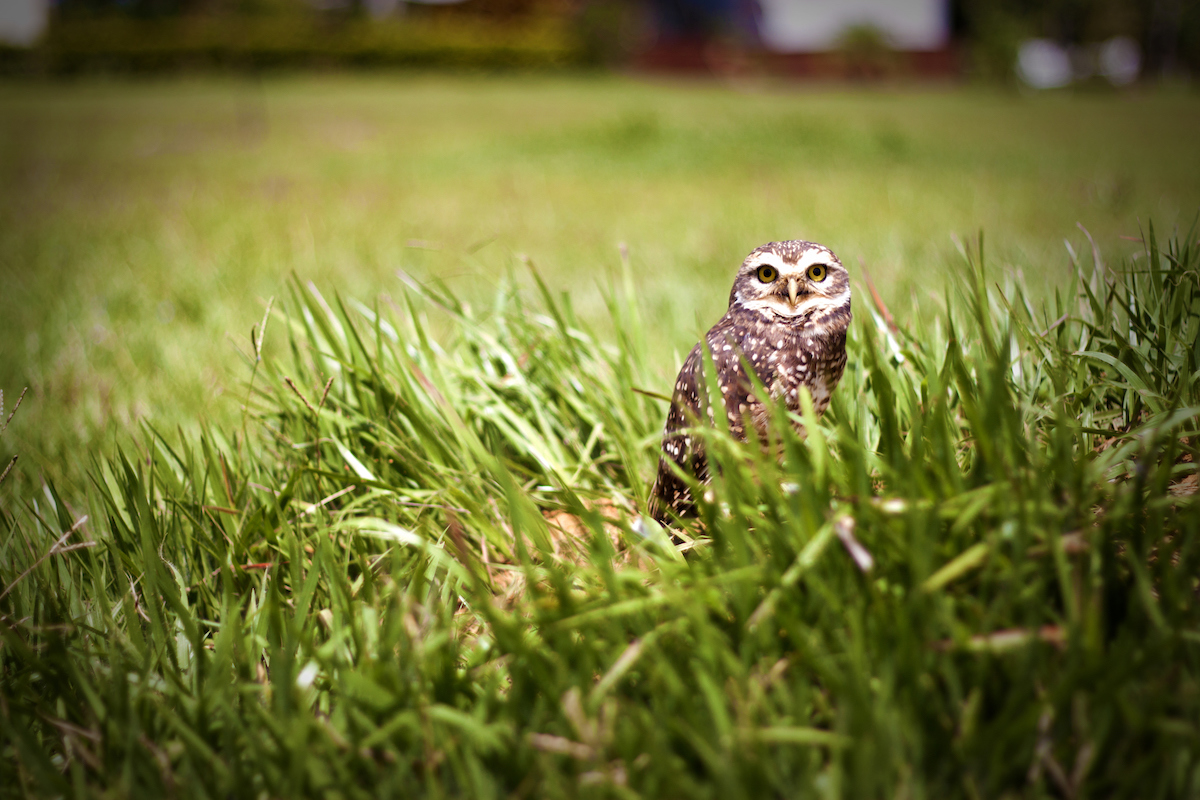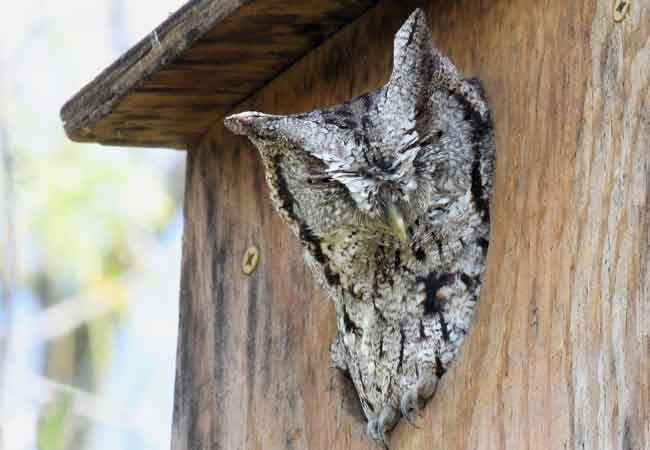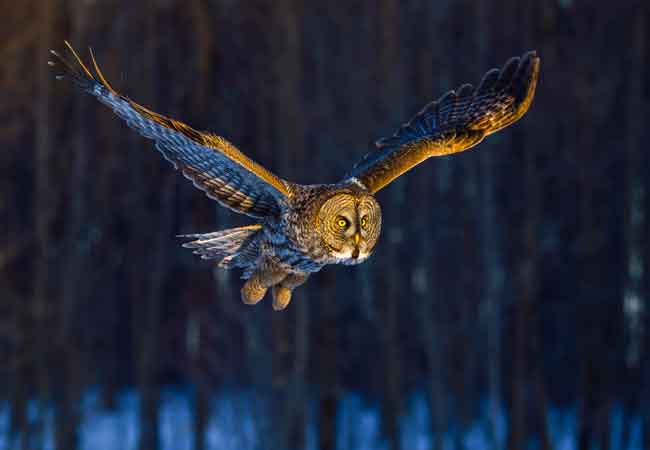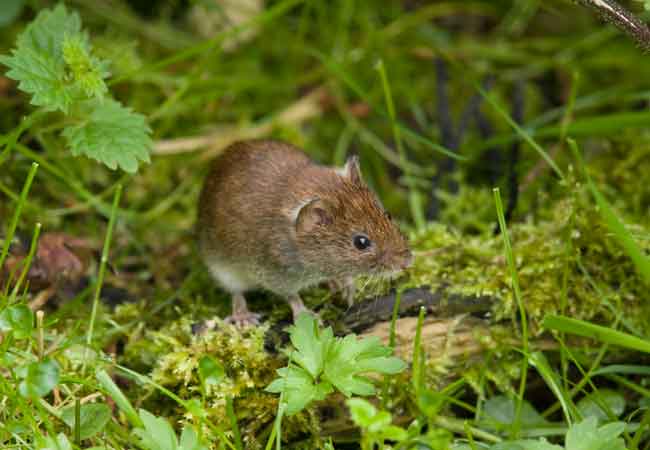

We may earn revenue from the products available on this page and participate in affiliate programs. Learn More ›
If mice, voles, or spiders have taken up residence on your lawn or in your garden, consider befriending their enemy: the owl. A host of small mammals and insects are on the menu of these graceful flying raptors, making owls a more powerful and natural alternative to chemical pest control.
The challenge is capturing that avian attention.
While there are roughly 216 species of owls across the globe, their nocturnal lifestyle and mainly carnivorous diet make them trickier to lure than birds that swoop in for seeds in a feeder. To tempt owls, you must take their unique nesting needs, diet, aversion to light, and bathing habits into consideration. Read on for four wise ways to beckon these birds and enlist their aid against pesky critters.
Table of Contents
1. Install a nesting box.

Owls, which don’t build their own nests, seek out nesting habitats in early winter in preparation for nesting from mid-February through mid- to late July. While some species, such as barn or barred owls, prefer the rotted hollows of trees or vacant squirrel or hawk nests, others, such as screech owls, will nest in man-made boxes. To attract these species, buy one pre-built or as a ready-to-build kit (prices start at around $40 online or from home and garden centers), or build a nesting box by assembling wood panels (plywood, cedar, etc.) into a fully enclosed box with a roof, a floor measuring at least 10 by 18 inches, and a five- to six-inch-wide square or round entrance opening on the front-facing panel.
Either the roof or one side of the box should be attached with hinges to facilitate opening the box and cleaning it annually once the owls have left—usually from late October to early December. Whether or not you paint the box, be sure to apply a preferably oil-based wood sealer to ward off water damage. Drill a few quarter-inch to half-inch holes near the roof for air circulation and seven to nine more holes in the floor for water drainage. Then, lay wood chips or sawdust on the floor of the nesting box for bedding, which will provide a soft cushion and keep any eggs from rolling around. (In the wild, owls rely on the bedding provided by squirrel or hawk nests, or the lichen, conifer sprigs, or leaves that collect in tree hollows.)
In early winter, hang the nesting box from a tree branch in the backyard, mount it on top of a sturdy pole, or nail the back of the box to a shed or a barn at a height of at least 10 to 20 feet from the ground. Owls like to be high above interference from humans and potential predators.
2. Turn off exterior lights at night.

With the exception of diurnal species such as the northern pygmy owl, which are active during the day and sleep at night, most owls hunt primarily under cover of darkness. This means they’re less likely to visit—and can even become disoriented by—brightly-lit homes featuring above-ground or underwater pool lighting, porch lights, spotlights, or floodlights, even if only the motion-activated variety. To make your home exterior more owl-friendly, manually turn exterior lights off after dark, or set a timer to have them automatically shut off after twilight.
If you’re concerned that your dark porch will tempt prowlers, consider installing a weatherproof passive infrared motion detector on your home exterior (from brands such as Optex). These systems can distinguish between the movement of humans and smaller animals so are less likely to sound at the presence of owls.
3. Maintain a large bird bath.

Since they obtain most of the fluid they need through food, owls aren’t big drinkers; it’s unlikely they’ll swoop in on a small, shallow-basin bird bath. On hot or humid days, however, larger do-it-yourself bird baths or store-bought alternatives (which start at $30 at home and garden centers) are a big draw. Their deep basins offer a generous gulp of water and double as a bathtub for cleaning or cooling after a hunting session.
Bird baths for owls should ideally be made of a durable material such as metal, and feature a deep basin (two inches minimum) with a sloping edge so owls can ease in. Position the bird bath in a secluded corner that people don’t often frequent to increase the odds of an owl alighting there.

Tried-and-True Advice
“Do not use rodent poison of any kind. If a rodent ingests the poison and an owl eats it, you will harm and likely kill the owl. Remember that some kinds of poison rodents may eat multiple times before dying, which increases the chance that an animal like an owl, eagle, or hawk will dine on a poison-laced rodent. Even a small amount of rodent poison can kill an owl.”
—Amber Guetebier, Contributing Writer
4. Lay off the lawnmower.

Certain species of owls hunt on grasslands, marshes, mature woodlands, and agricultural fields. A homeowner striking out with other means of banishing field mice or voles who is eager to have an owl visit might wish to mimic these rustic features by easing up on regular lawn maintenance, thus creating a more attractive hunting ground. It might seem counterintuitive, but giving pests a more hospitable spot temporarily may, in the long run, attract nocturnal predators. Don’t mow for a week or so—also permitting shrubs, low-hanging tree branches, and/or weeds to grow a little longer before pruning or pulling, and allowing dead leaves, twigs, and flowers to pile up rather than raking t immediately. Let nature take its course and resume yard care as usual when critters vamoose.
When It’s Not So Wise to Attract Owls
Homeowners with small pets like guinea pigs, or farm animals like chickens, should think twice before attracting owls. Whether owls view them as prey or mere annoyances, the predatory birds can swoop in on and injure or kill the animals. Moreover, these small animals can inadvertently scare off the very rodents and other prey whose presence is needed on your property to attract owls. Even if you only have large pets, if you intend on attracting owls, aim to keep them indoors after dark, so they won’t threaten hunting owls or scare off their prey.
